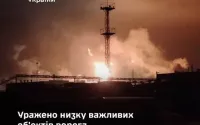Xi uses Russian PM's Beijing visit to reassert dominance following Trump talks
global.espreso.tv
Wed, 05 Nov 2025 20:49:00 +0200

The author of the Resurgam Telegram channel discussed the issue.Just days after President Trump's high-profile meeting with Xi Jinping on October 30, China’s leader hosted another crucial visitor: Russian Prime Minister Mikhail Mishustin. While the Nov. 3-4 meeting was framed as a routine governmental session, its timing and high-level status—including a personal meeting with Xi—have sent ripples through geopolitical circles.While many experts quickly labeled the visit a knee-jerk reaction by a "scared" Kremlin, concerned about its economic partnership with China, sources suggest the meeting was likely planned in advance, consistent with annual end-of-year scheduling. However, the nature of the visit, particularly Xi's personal involvement on the second day, is being interpreted as a direct "imprint" of the Trump-Xi talks.Analysts are debating the visit's primary motive: was it a simple confirmation of loyalty, or was Moscow being called "to the carpet"? The growing consensus is that it was both. On one hand, China used the meeting to demonstrate its profound influence and Moscow's dependency, sending a clear message to the U.S. that it controls its key ally.On the other hand, the summit's format strongly indicated a summons. The practical focus of the memorandums signed centered on one critical issue: the Northern Sea Route (NSR). Beijing, which views the Arctic trade corridor as its own strategic asset and an alternative to the Suez Canal, was reportedly angered by reports that the Kremlin has been "bargaining" with Washington, attempting to offer American businesses a stake in the route.Beijing's view is clear: Russia is merely the "managing company" for a route that passes through its waters, not an owner free to negotiate with China's rivals. The agreements signed appear to be a forceful reminder, designed to lock in China's geopolitical dominance over the route and simultaneously strip the Kremlin of a key strategic bargaining chip it hoped to play with the Trump administration.










